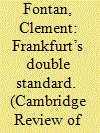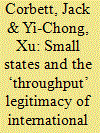| Srl | Item |
| 1 |
ID:
164353


|
|
|
|
|
| Summary/Abstract |
In this article, I examine the bias in favour of financial markets displayed by the European Central Bank (ECB) during the Eurozone crisis. Having analysed the roots of the ECB’s bias, I explore the discrepancy between the conditionality of ECB financial support that is directed towards states and that which is directed towards markets. On the one hand, the ECB has exerted strong coercive and cognitive pressures to reform Eurozone economic governance in a market-friendly way. On the other hand, it has employed monetary measures to save large Eurozone banks from a complete meltdown without controlling how these banks use their provided liquidities. I conclude by stressing the democratic problems engendered by the ECB’s bias.
|
|
|
|
|
|
|
|
|
|
|
|
|
|
|
|
| 2 |
ID:
164356


|
|
|
|
|
| Summary/Abstract |
The number of studies on children in war has steadily increased in the fields of international relations, international law and moral philosophy in recent years. Most of this research has evolved around the legal and moral status of children in war. The status of girl soldiers is particularly intriguing, as it conflates common assumptions about both women and children as innocent victims of war. In this paper we look at narratives of children’s victimhood in the context of war by concentrating on girls who participated, in various forms, in the two Liberian civil wars from 1989 to 1997 and 2000 to 2003. Drawing on interviews conducted with women war veterans, we make the case that the study of child soldiers in general—and girl soldiers in particular—would benefit from a more contextually sensitive and empirically informed study of girls’ experiences, specifically regarding the possibilities and limitations of their capacity to be agents of war. We demonstrate how the agential capacities of children are case sensitive and argue that scholarship must better take into account the complex contextuality of childhood and agency in the study of children in war.
|
|
|
|
|
|
|
|
|
|
|
|
|
|
|
|
| 3 |
ID:
164352


|
|
|
|
|
| Summary/Abstract |
Over the last three decades, constructivist scholars of international relations have created a rich body of literature on the influence of global norms. Until recently, the vast majority of that work focused on norms originating in the developed world and neglected the ideational impact of developing countries. This article confronts this oversight in the literature by tracing the rise of the “common but differentiated responsibility” (CBDR) norm in international environmental politics. The CBDR principle traces its origins to the developing world and today it is part of the framework principles of international environmental agreements. Thus, it represents a global norm promoted by, rather than diffused to, the developing world. In the process of tracing this norm’s rise, this article generates a set of hypotheses about the conditions under which developing countries create global norms.
|
|
|
|
|
|
|
|
|
|
|
|
|
|
|
|
| 4 |
ID:
164355


|
|
|
|
|
| Summary/Abstract |
This article adopts a constructivist approach to explain how and why the Obama administration shifted its policy narrative and practices towards Afghanistan from 2011 onwards. It recognizes that the ‘Global War on Terror’ narrative helped pave the way for a set of institutionalized militarized practices and collectively held beliefs that have structured the post-9/11 world. At the same time, the article argues that the Obama administration’s ‘selling’ of its Afghan policy provided the space for an evolving approach. This policy narrative involved the ‘existential threat’ of transnational militant actors operating out of an Afghanistan–Pakistan ungoverned space being downgraded to a ‘containable’ one. Three key factors prompted this change: the administration’s discursive decoupling of the Taliban and al-Qaeda; the changing perception that the threat posed by ‘al-Qaeda and its affiliates’ was a decentralized one; and the United States’ changed conception of Afghanistan as a ‘safe haven’ for transnational terrorists.
|
|
|
|
|
|
|
|
|
|
|
|
|
|
|
|
| 5 |
ID:
164354


|
|
|
|
|
| Summary/Abstract |
The unequal participation of member states in international organizations (IOs) undermines IOs’ legitimacy as global actors. Existing scholarship typically makes this assessment by referencing a combination of input—the interests IOs serve—and output—the decisions they take. This scholarship does not, however, pay enough attention to how IOs have responded to these concerns. We argue that IOs have used the participation of small states—whose membership most studies typically ignore—as an important means of generating what Vivian Schmidt calls ‘throughput’ legitimacy for their operations. We organize our analysis of ‘throughput’ legitimacy in IOs around four institutional mechanisms—(1) agenda setting; (2) leadership (s)election; (3) management and operation; and (4) service delivery—in which all states seek to exert influence. What emerges is an account of IOs seeking to balance ‘inputs’ and ‘outputs’ by way of ‘throughputs’. We conclude by arguing for an expanded focus on the means by which IOs generate ‘throughput’ legitimacy in future research.
|
|
|
|
|
|
|
|
|
|
|
|
|
|
|
|